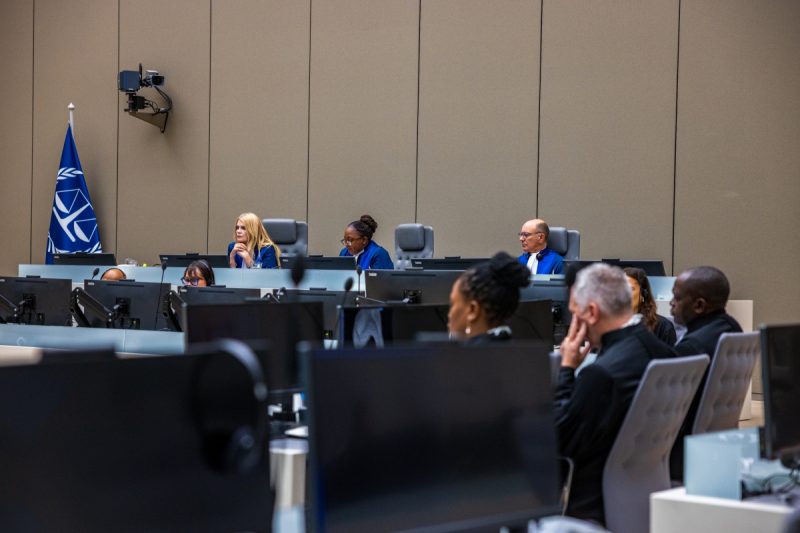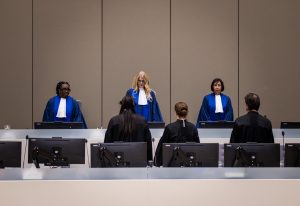By: Tiffany D. Johnson
Impunity Watch News Staff Writer
THE HAGUE, Netherlands – On September 9, 2025, the International Criminal Court (ICC) opened a landmark evidentiary hearing against fugitive Lord’s Resistance Army (LRA) leader Joseph Kony, in what has become the Court’s first-ever in-absentia proceedings. Kony, who has evaded capture since his indictment in 2005, faces 39 counts of war crimes and crimes against humanity for atrocities committed in northern Uganda and neighboring states.

Background
Kony founded the LRA in the late 1980s, leading a violent campaign of abductions, child soldier recruitment, sexual enslavement, and mass killings that terrorized Central Africa for decades. The ICC issued its first arrest warrants against Kony and senior LRA commanders in 2005, charging them with crimes including murder, rape, enslavement, and the conscription of children under 15. While several commanders have since been captured or tried domestically, Kony has remained at large despite multinational efforts to arrest him.
Until recently, ICC procedure required the accused to be physically present. However, Rome Statute amendments and judicial interpretation now allow in-absentia proceedings when suspects remain fugitives but have been given reasonable opportunity to appear. The Kony case is the first to invoke this expanded procedure.
Prosecution, Defense, and Victims
The Office of the Prosecutor (OTP) argued that proceeding without Kony was essential to preserve fragile evidence and to recognize victims who have waited nearly two decades for judicial acknowledgment. The charges, brought under Articles 7 and 8 of the Rome Statute, allege crimes against humanity and war crimes tied to widespread and systematic attacks on civilians.
Although Kony was not present, the Court appointed standby defense counsel to safeguard his procedural rights. Counsel raised concerns about the challenges of mounting a defense without the accused’s participation, including difficulties contesting evidence or questioning witnesses.
At the same time, hundreds of victims have registered to participate in the case, and several survivor testimonies were heard in the opening days. Victim representatives stressed that the proceedings are not only legal milestones but also critical for community healing and truth-telling.
Judicial Developments
The judges of Pre-Trial Chamber II ruled that in-absentia hearings were justified under the Rome Statute, citing Article 63(2) (which allows proceedings without the accused in exceptional circumstances) and recent amendments permitting such hearings when fugitives have been given a reasonable opportunity to appear. They emphasized that Kony has been under an active ICC arrest warrant since 2005, has repeatedly failed to surrender, and therefore cannot indefinitely block justice by evasion.
The charges against Kony include crimes against humanity (Article 7) and war crimes (Article 8), encompassing murder, enslavement, rape, and the conscription of children. While judges stressed that any final conviction and sentencing would still require Kony’s physical presence, they determined that preserving evidence, hearing victims, and formally recording proceedings outweighed further delay. Early sessions included documentary evidence, NGO reports, and expert testimony on the LRA’s command structure and Kony’s personal role in ordering atrocities.
Significance
The Kony in-absentia proceedings represent a historic expansion of the ICC’s toolkit for combating impunity. For victims, the hearings provide long-delayed recognition and an official record of the crimes. For international justice, the case raises important debates about how to balance fair-trial rights with the imperative to ensure accountability, even when suspects remain beyond the Court’s reach.
As the hearings progress, the ICC’s handling of Kony’s case may set precedent for addressing other long-term fugitives and will test whether international criminal law can adapt without compromising legitimacy.
For further information, please see:
ICC opens war crimes hearing against Ugandan rebel Joseph Kony | ICC News | Al Jazeera
International Criminal Court holds hearings on charges against Joseph Kony | AP News
International Criminal Court holds hearings on charges against Joseph Kony | AP News
![From left, the heads of state of the three countries: Mali's Assimi Goita, Niger's General Abdourahamane Tchiani and Burkina Faso's Captain Ibrahim Traore [File: Mahamadou Hamidou/Reuters]](https://img-s-msn-com.akamaized.net/tenant/amp/entityid/AA1N98ke.img?w=768&h=525&m=6&x=1567&y=763&s=1220&d=251)

